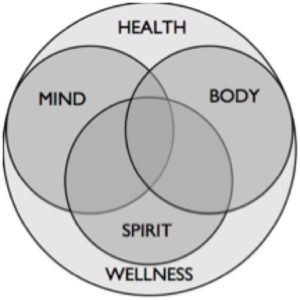“Functional.” “Holistic.”
“Nutritionist.” “Dietician.”
These terms get tossed around, and while they’re all interrelated, they’re not synonymous. In my practice I focus on “functional” and “holistic” nutrition, so want to take the time to clarify what this means!
But first it’s important to define WELLNESS.
Wellness: The intersection of mind, body, and spirit, and how these impact overall health.

Holistic Nutrition
- Focus on wellness to achieve optimal health
- Focus on foods and nutrients to nourish the body and help it thrive
- poor nutrition can contribute to physical and emotional issues
- balanced nutrition can nourish the body and support it in operating at its full potential
- Clients select their own personal wellness goals
- Work includes addressing diet, lifestyle habits (i.e., exercise and movement, mindfulness, relaxation and stress management, sunshine and nature, mealtime hygiene, sleep hygiene, and reduction/elimination of toxins from the home and personal care routine) to improve personal health and wellbeing while pursuing chosen goals
Functional Nutrition
- All of above holistic nutrition principles
- Search for root cause of symptoms presented by the client
- May work in partnership with other health care providers to provide a comprehensive approach
- Lab work, including specialty labs, is often incorporated into the understanding of root cause, and the functional nutritionist is looking for optimal ranges as opposed to disease state ranges (going beyond “My doctor said my labs look normal, but I still feel crappy.”)
Functional Holistic Nutrition vs. Dietetics
Dietetics:
- Practiced by a registered dietician, licensed by the state
- Can diagnose, treat a subset of diseases and conditions
- Often follow the USDA MyPlate dietary guidelines, American Heart Association and American Diabetes Association guidelines for food consumption
- Focus is on food, may not explore impact of stress, environmental toxins, or other lifestyle factors that impact health and wellness
- Similar dietary pattern may be applied to all clients based on their diagnosis
My Functional Nutrition Practice:
- Not beholden to a license, so not limited to only the dietary recommendations outlined by larger government-funded organizations that are not necessarily health-promoting
- Sought out extensive training and credentialing in nutrition and applied functional medicine, plus ongoing continuing education
- No diagnosing, treating, or curing disease, and instead focus is on overall wellness strategies to support clients in working towards resolving their symptoms
- Evidence-based dietary, supplement, and lifestyle recommendations tailored to a client’s unique bioindividuality based on both rapid relief and root cause analysis
Regardless of the provider that you choose, it is important to ask them about their educational background and additional training, as well as what to expect.

